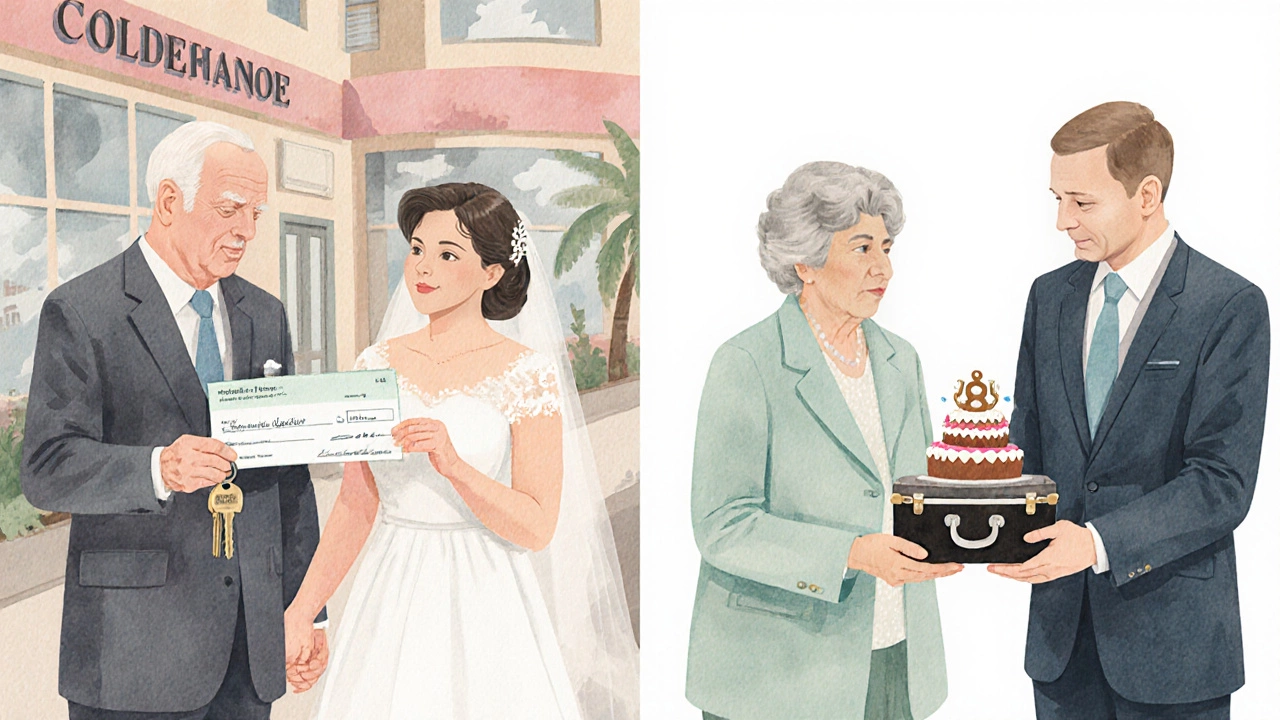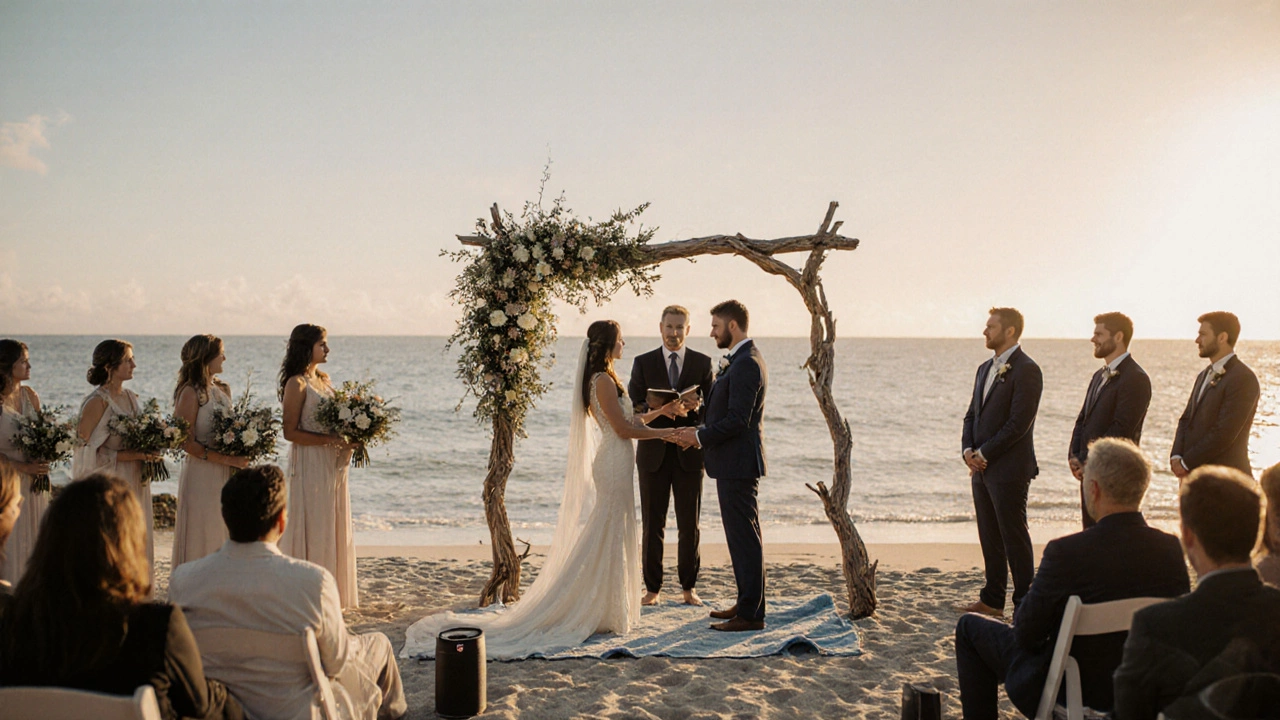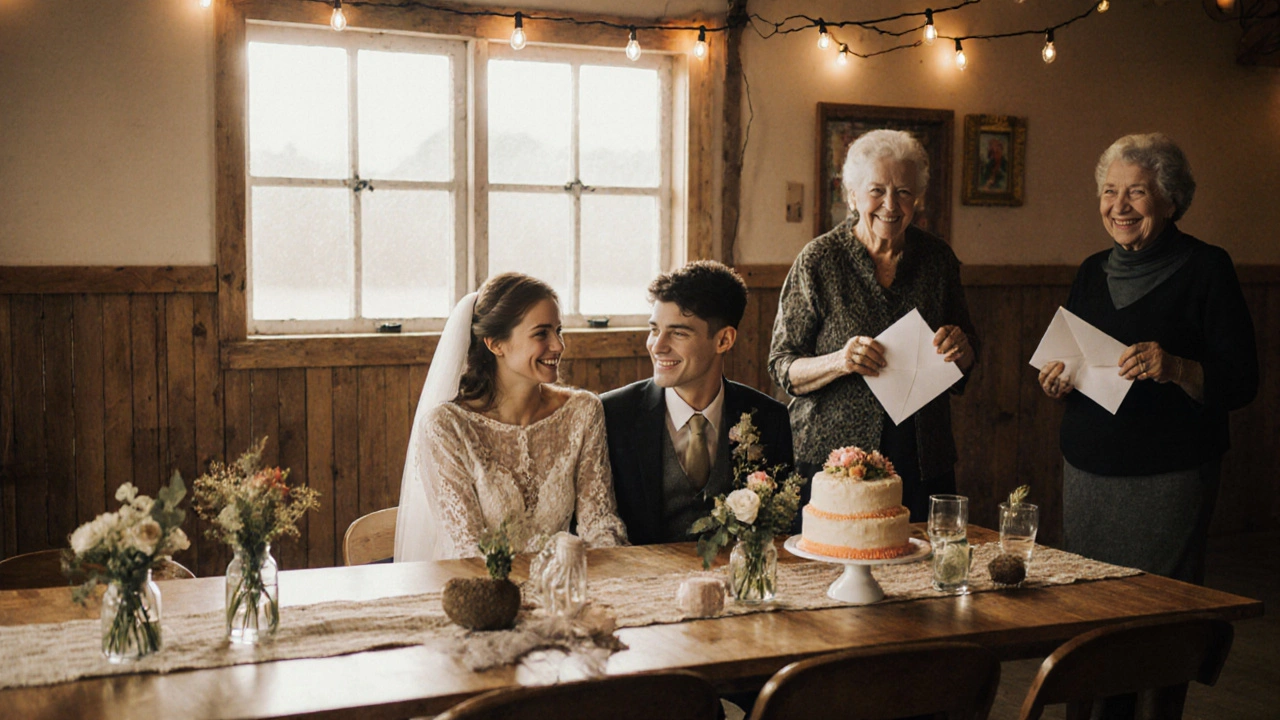Wedding Cost Calculator for New Zealand (2025)
Based on 2025 New Zealand wedding data. Average wedding costs range from $30,000 to $45,000 (excluding honeymoon).
Parental Contribution Estimate
Based on New Zealand wedding data, parents typically contribute between $5,000 and $20,000 for the wedding.
62% of couples pay for their own wedding, while 23% have the bride's parents cover more than half the cost.
There’s no rulebook that says the bride’s parents must pay for the whole wedding. Not anymore. But if you’re asking this question, you’re probably trying to figure out what’s fair, what’s expected, and what won’t leave your family broke before the first dance.
What’s the real cost of a wedding in New Zealand?
In 2025, the average wedding in New Zealand costs between $30,000 and $45,000. That’s not including the honeymoon. For couples in Auckland, it’s often closer to $50,000 if you’re booking a popular venue like the Auckland Domain, a waterfront function room, or a vineyard in Waiheke. Venues alone can eat up $8,000 to $20,000 - and that’s before food, drinks, music, or flowers.
Here’s the hard truth: no one owes you money. Not your parents, not your in-laws. But if they want to help - and many do - it’s smart to talk about it early. Not after the invitations are printed.
Where did the ‘bride’s parents pay’ idea even come from?
The old tradition came from a time when women were seen as moving from their father’s care to their husband’s. The wedding was a gift from the bride’s family to the groom’s - a way to show status, secure alliances, and cover the bride’s dowry. It’s outdated. But the habit stuck.
Today, 62% of couples in New Zealand pay for their own wedding, according to a 2024 survey by the New Zealand Wedding Association. Only 23% of brides’ parents cover more than half the cost. And 15% pay nothing at all.
What do bride’s parents actually pay for today?
If they choose to contribute, it’s rarely the whole thing. Most families split costs in ways that make sense for them. Here’s what’s common:
- Reception and catering - $10,000 to $25,000
- Wedding venue - $5,000 to $15,000
- Wedding dress and accessories - $1,500 to $5,000
- Flowers and décor - $2,000 to $6,000
- Wedding cake - $800 to $2,500
- Photography and videography - $3,000 to $6,000
Some parents pay for the entire reception. Others cover just the dress and the cake. One couple in Hamilton had their mum pay for the venue and their dad cover the band. Another couple’s parents gave them $15,000 as a lump sum - no strings attached.
When should parents step in - and when should they stay out?
Parents should help if they can afford it and if they genuinely want to. Not because someone told them to. Not because their neighbor’s daughter got a $40,000 wedding. Not because they feel guilty about not paying for college.
But here’s the line: if they’re paying, they shouldn’t dictate the guest list, the theme, or the menu. That’s the couple’s wedding. If they want to be involved, they can offer ideas. Not demands.
One mother in Tauranga offered to pay for the venue if her daughter agreed to limit the guest list to 80 people. Her daughter said yes. They saved $12,000. Everyone was happy.

What if your parents can’t afford to pay?
Then they don’t pay. And that’s okay.
Too many families stress over this. Parents feel like failures. Kids feel guilty. But weddings aren’t a measure of love or worth. A $5,000 backyard wedding with homemade cake and a playlist on Bluetooth speakers can mean more than a $50,000 event with chandeliers and imported champagne.
Many couples in 2025 are choosing to marry with no parental help. They save for a year. They work extra shifts. They cut the guest list. They use free venues like public parks or community halls. And they still have beautiful, meaningful days.
How to talk about money without ruining the relationship
Start the conversation before you book anything. Say something like:
"We’re figuring out how to pay for the wedding, and we’d love to know if you’re able to help with anything. We’re open to ideas - whether it’s covering the venue, helping with the dress, or just giving us a gift toward our future. No pressure at all. We just want to plan together."
Don’t say: "Everyone’s parents pay for this." Don’t say: "We’re expecting you to cover the reception." Don’t say: "It’s tradition."
Instead, be honest. Be grateful. Be open to hearing "no."
If they say yes, write it down. Agree on what’s covered. Put it in writing - even if it’s just an email. That way, there’s no confusion later.
What about the groom’s parents?
They’re not off the hook - but they’re not on it either. In modern weddings, it’s common for both sets of parents to contribute if they can. Some pay for the rehearsal dinner. Others help with the honeymoon. A few give cash gifts toward the couple’s first home.
There’s no rule that says the bride’s side pays more. In fact, 41% of couples in New Zealand now split the cost equally between both families. Another 33% split it based on who can afford what.

What if you’re paying for it all?
That’s fine. And brave.
More couples are choosing to pay for their own weddings than ever before. It gives them control. It removes pressure. It lets them choose what matters to them - not what their parents think matters.
If you’re paying, don’t feel guilty. Don’t feel like you’re doing something wrong. You’re not failing your family. You’re building your own future.
Real examples from real couples
Here’s what it looks like in practice:
- Emma and Liam (Auckland): Their parents gave them $10,000. They paid $28,000 themselves. They got married at a community hall, hired a local band, and made their own centerpieces. Their wedding cost $38,000. They still have $5,000 saved for their first trip.
- Maya and James (Christchurch): Maya’s parents paid for the venue and catering. James’s parents paid for the photographer and the cake. The couple paid for their attire and the honeymoon. Total cost: $42,000. Everyone was happy.
- Ryan and Sophie (Dunedin): Neither set of parents could help. They worked two jobs for two years. They saved $35,000. They got married on a beach with 30 guests. No one missed a thing.
Final thought: It’s your day, not their balance sheet
There’s no magic number. No perfect split. No amount that makes you a "good daughter" or "bad son."
What matters is that you’re starting your marriage with clear conversations, mutual respect, and no hidden debt. Whether your parents give $500 or $25,000, what you do with that gift - and how you treat them while you’re doing it - matters more than the number.
Plan your wedding around your values, not old traditions. If your parents want to help, celebrate that. If they can’t, celebrate your independence. Either way, you’re building a life - not a bill.
Do bride’s parents still have to pay for the wedding?
No, they don’t have to. The idea that they should is an outdated tradition. Today, most couples pay for their own weddings, or split costs with both sets of parents. The only obligation is to communicate openly and honestly.
How much should bride’s parents contribute if they want to help?
There’s no set amount. It depends on their budget. Some give $5,000 for the dress and cake. Others cover the venue and reception. The key is to agree on what they’re covering - and what they’re not - before any bookings are made. Don’t assume. Ask.
What if my parents offer to pay but I don’t want their money?
That’s okay. You can say thank you and explain that you’d prefer to pay for it yourself. Many couples do this to avoid pressure or control. You can still accept their emotional support - just not the money. Offer alternatives like helping with guest accommodations or organizing the rehearsal dinner.
Can I ask my parents for a specific amount?
Yes - but only if you’re prepared for them to say no. Instead of saying "I need $15,000," say "We’re estimating $40,000 total and wondering if you’d be able to help with part of it. What feels comfortable for you?" This keeps the conversation open and respectful.
Is it rude if my parents don’t pay anything?
No. It’s not rude. It’s not personal. Many parents have financial limits, medical bills, retirement savings, or other children to support. Judging them for not paying will only create distance. Focus on what you can control: your own planning, your own gratitude, and your own joy.

